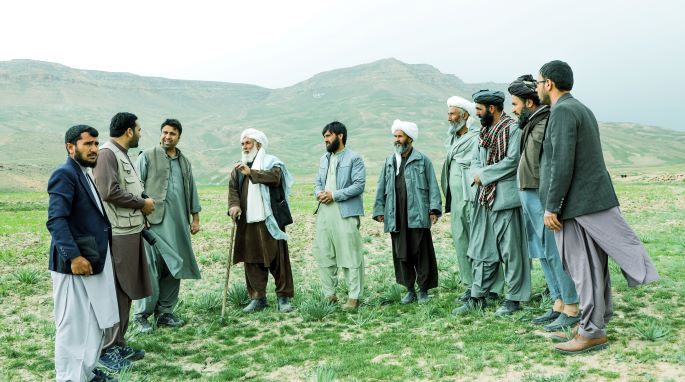Afghanistan diaries
Forests for people: traveling to the remotest province to visit forestation efforts by FAO

©FAO
Located in the remote hills of northwestern Afghanistan sharing borders with Herat, Ghor, and Faryab provinces as well as Turkmenistan, Badghis is one of Afghanistan's most underdeveloped provinces, with the highest poverty rate. Agriculture is the main source of people's income. Badghis not only has little infrastructure and unpaved roads, but it also suffers from a continued shortage of water.
It was the first time I visited Badghis, but I had heard a lot about it from colleagues and in the media. My regional colleagues spoke about how the project sites were front lines of the war before August 2021 and how they had to travel for many hours on motorbikes because the remote areas were inaccessible by car.
Our flight from Kabul to Qala-e-Naw, the provincial capital of Badghis, took two and a half hours with a brief stop in Ghor province on the way. The lack of infrastructure was evident from the first moments of our stay in the northwestern province as some roads within the provincial capital were unpaved.
In addition to the provincial center, we traveled by car to two districts, Abkamary and Qadis around 60 km away from the center, located in opposite directions. It was almost impossible to visit some of the sites a few years back due to insecurity. I was happy to be able to travel to the previously unreachable areas of my country as security has comparatively improved, but the sense of excitement was also merged with despair to see little to no signs of development work in the villages that I visited during my mission. Development work could not reach remote areas during the last two decades mainly because of the war in the country. The area around the pistachio forest was the front line of the war and pistachio forests were used as a shield, so forest cover was lost as a result.
On the second day of our mission, we drove for about three hours on muddy roads to reach Mubarak Shah village in the Abkamary district. The area was enveloped in swathes of green hills, with what looked like the just germinated wheat crop. As we drove to the site, we saw that the land was very fertile, and the farmers did not need to use any fertilizer to grow wheat. In between these rolling green hills were the pistachio sites – both manmade by FAO that has just started to germinate, and further down, as seen through the binoculars, the centuries-old forest that is protected by FAO through the Forest Management Association (FMA) with funds from the Global Environment Facility (GEF).
The livelihood of people in the Abkamary district mostly relies on the existing pistachio forest as well as agricultural products such as wheat, cumin, peas, melon, and watermelon in rainfed lands. Some residents harvest pistachios and other agricultural products once a year and sell them in the local market, while others cut pistachio trees and use them as wood fuel for cooking and heating purposes.
Lack of drinking water is a major issue for the people in Abkamary. Families lay out plastic sheets on the roofs of their houses during spring and summer to collect rainwater, which is used for drinking after being filtered using traditional ways.
On this day, I climbed up the hill and saw pistachio sites through the binoculars which looked like a green carpet laid out on the hills, while climbing down I jumped from a terrace to the hillside and felt extreme pain in my back that caused me to visit an orthopedic doctor - signs that my city-self is not used to this type of a terrain.
On the third day, we went to the Qadis district. We drove for four hours to get to Deh Beranj village on mud-spattered and unpaved roads to oversee rangelands as well as barns and solar passive houses established by FAO. The solar passive houses were built to decrease the demand for wood fuel and reduce pressure on the existing rangeland, while barns were improved to increase the bio-microbial resistance of the livestock - which leads to more production and subsequently enhanced livelihoods of households.
Residents in this district keep livestock and mainly depend on the natural rangeland in the surrounding hillsides for feeding the livestock. Lack of other resources often forced people to uproot shrubs and bushes from rangelands and sell them in the local market as a means of income, causing massive rangeland degradation.
We had to cut short visits to other barns as there was a sudden downpour which would mean us getting stuck on the muddy road as there was no tarmac. A rangeland area rehabilitated by FAO in Qadis was named after FAO and the project donor GEF as the community’s expression of their appreciation for our work.
While returning to Kabul, the UNHAS flight to and from Badghis was canceled due to the rainy weather forecast, as there are only two flights in a week to the province. Therefore, we made an early morning dash to the neighboring Herat province to catch an alternative commercial flight back to Kabul. On the way to Herat, we passed through many muddy roads and even had to go through a risky section of the road where there was no road at all and was muddy from the previous day’s continuous rain.
We take high risks and make all possible efforts to continue to be at the forefront of working towards promoting the protection and sustainable use of natural resources while meeting society’s growing needs for decent and resilient livelihoods to better serve vulnerable local communities like those in Badghis.

Average rating: